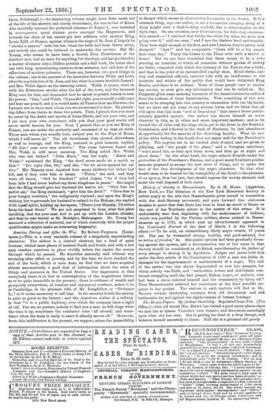America During and After the War. By Robert Ferguson. (Long-
mans.)--This ie a very readable volume of a-singularly unpretending character. The author is a shrewd observer, has a fund of quiet humour, visited most places of interest North and South, and with a few easy touches contrives to place vividly before 'the reader the scenes through which he passed. He describes manually and without any straining after effect or jocosity, and by 'the time we have reached the end of the book, which is soon done, we find that we have acquired almost unconsciously a good deal of information about the etate of things and manners in the United States. Our impression is that everybody there is so lost in contemplation of the magnificent future as to be quite insensible to the present ; there is evidence of wealth and prosperity-everywhere, of comfort and enjoyment nowhere, unless it be at Cambridge, in the pleasant villa of Mr. Longfellow, or "Professor L.," as it seems necessary to call him. In the monster hotels the misery is quite as great as the luxury ; and the American notion of a railway is that "it is a public highway, over which the company have a right of toll. You see no porters, nobody to find you a seat, no bell rings when the-time is up, sometimes the conductor cries ' all aboord,' and some- times when the train is ready to start it silently moves off." Moreover, from this indifference to the present, we suppose, arises the insensibility to danger which seems to characterize locomotion in the States. It is is common thing, says our author, to see a locomotive creeping along at a dizzy height over a frail-looking scaffold, like a steam-engine on the tight rope. On one occasion, near Chattanooga, the following conversa- tion ensued :—" I watched that bridge the other day when the train was going over it," said one man, " and 'I saw the -timbers bend and tremble. They were right enough at the first, and now I reckon they're pretty well decayed." "Aye !" said his companion, "there will be a big smash here some day." Fancy the letters to the Times over such a matter at home ! But we are here reminded that there seems .to bo a yoke
pressing on America, to which all countries without grades of society- are liable, compared with which the tyranny of the Tudors was a trifle, and that is the yoke of an uncontrolled employe class. Hotel clerks, rail- way and steamboat officials, exercise rule with an indifference to the- interests and wishes of the public that would have delighted King Bombs, and there is no redress. None of those people care to render any service, or even give any information that can be relied on. Mr.. Fergttsongives some amusing instances of the inoonvenienoo he suffered from the coolness of these functionaries. Now, something of this sort seems to bo creeping into this country in connection with our big hotels,
but we have not yet come to any serious harm, and we think that all• will agree that this is an "evil of democracy " that cannot be-too pertin-
aciously guarded against. Our author has shown himself an acute observer in this, as in other and more important matters; and as he visited the oil cities and the siege cities, got to the front in the Sanitary Commission, and followed in the track of Sherman, he had abundance
of opportunity for the exercise of his sketching faoulty. What he saw- of the white feeling in the South does not augur -well for the President's
policy. The negroes are in an excited state of-mind, and are given to pilfering, and "the people of the place," said a Georgian merchant, "won't stand this, so they spot them down, and than go at night and shoot them." On the other hand, the negro schools flourish-under the protection of 'the Freedmen's. Bureau, and a good many-Southern gentle- men are prepared to accept the new state of things, and to make the best of the free development of the negro character. So that what would seem to be wanted for the tranquillity of-the South is the presence of an agency, firm but just, that should repress the rowdy element, and assist the well disposed of both races.






























 Previous page
Previous page